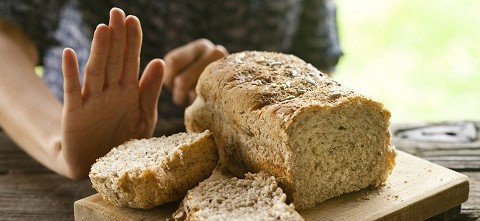[ad_1]
Bloating. Constipation. Gas.
These are just a few uncomfortable symptoms of celiac disease before diagnosis.
Celiac disease is an autoimmune reaction to the consumption of gluten, a protein found in wheat, barley and rye.
It comes into play when gluten causes a reaction in the small intestine that prevents someone from absorbing nutrients.
According to Lucy Frey, Registered Dietitian at Corewell Healththis is different from a gluten sensitivity, but can present in a similar way.
“Celiac disease is confirmed by tests and a biopsy of the small intestine,” she said.
Frey said that one in 133 people in America, or about 1% of Americans, is estimated to have gluten sensitivity or celiac disease. And nearly a third of Americans follow a gluten-free diet.
“It’s a very fad diet,” she says. “And there are many reasons why someone tries to go gluten-free. The first is that they think it’s healthier, but also often because they report certain symptoms to gluten.
Signs and symptoms
The most common symptoms of gluten intolerance are based on gastrointestinal distress, including vomiting, diarrhea, and excessive gas. And in childrensometimes they will not gain weight as they age or develop.
Frey said a diagnosis of celiac disease comes with the need for strict lifelong monitoring. gluten free diet.
She said the most common things to avoid include bread, baked goods, cookies, but gluten can hide in any type of food, including spice blends and processed meats. .
“Gluten is in so many different foods,” she said. “And the labeling regulations aren’t strict around the term ‘gluten-free’.”
She said labeling can be misleading, so it’s important that people with celiac disease understand how to navigate labels. And that “gluten-free” doesn’t necessarily mean it’s safe for someone with celiac disease.
“What’s most important for a celiac person is not to limit themselves to ‘gluten-free,'” she said. “Over time, learn to adjust a recipe to make it gluten-free if you need to and that will expand your options.”
Simple exchanges
An easy swap: replace the couscous with rice or quinoa.
And while gluten-free baking can be tricky, Frey said there are helpful websites and blogs offering specific alternatives.
She said that when grocery shopping, personal preferences can guide revenue exchanges.
Diet is the treatment for this autoimmune disease and luckily no medication is needed.
“The side effects are an increased grocery bill and more time and resources to buy and prepare food,” she said.
Frey said she discusses cost-effective alternatives and cost-effective ways to follow a gluten-free diet with her patients because even trace amounts of gluten can cause problems and reactions in the small intestine leading to malabsorption.
“There are no cheat days on this diet,” she said. “Knowing how to handle potlucks, parties and eating out is important. It’s about having a personal conversation with your dietitian and knowing what the right choices are.
Browse resources
Frey said celiac disease can cause a lot of confusion for patients, and his pediatric gastroenterology team does their best to help patients and families understand the plethora of information on the subject.
“Trust that you can adapt it to your life by taking it one step at a time,” she said.
Frey herself has celiac disease and said that when she ate pasta in a restaurant she had to make sure it had been boiled in a different water than other pasta. And fries cannot be cooked in the oil used with breaded dishes.
“I was diagnosed almost 20 years ago, long before any gluten-free trend, and my parents were ordering food for me from a paper catalog at one point.”
She said she suffered from malnutrition and was not gaining weight because the condition was less well understood at the time and not as widely screened.
“When I became gluten-free, it changed my life forever,” she said. “I was full of energy, I was growing, gaining weight and feeling better. I didn’t know I felt so bad until I felt good all the time.
Frey said her pediatric dietitian had a huge impact on her choice of career as a dietitian.
“At the age of 14, I had to be very careful to read labels,” she said. “And I experienced firsthand understanding the power of food as energy. I felt awesome the whole time.
Frey said she and her team are now managing a large portion of new celiac disease diagnoses in West Michigan.
“One of the hardest parts of my job is debunking myths,” she said. “Patients today sometimes receive conflicting information from friends, family or the internet. But I do my best to keep them on track.
[ad_2]
Source link
